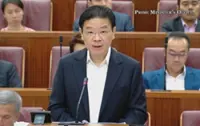KUALA LUMPUR: The Retirement Fund Incorporated (KWAP) is eyeing new real estate acquisitions overseas in the medium term, particularly in France and Germany, despite the volatility in the global market.
Chief executive officer Datuk Wan Kamaruzaman Wan Ahmad said KWAP, which is the country’s second largest pension fund, would continue to grow investments abroad with higher asset allocation next year at about 10% of its fund as compared to the current 5%.
Due to the current economic uncertainties which have led to lower returns from its investments, he said KWAP was willing to consider lowering its return ratio for real estate investments.
“We do have minimum returns that we are expecting from our real estate investments; unfortunately, the one that we are looking at, located in Paris and Germany, have below 5% ratio.
“But, at the same time this (is the) new normal (low investment return) environment and it could prolong, which is also the reason why we are revising minimum return ratio from 5% at present to 4%,” he said.
Wan Kamaruzaman told Bernama this on the sidelines of Be Creative: Invest in France breakfast meeting organised by the French Embassy recently.
Asked on its investment in the United Kingdom, Wan Kamaruzaman said KWAP’s exposure in the country stood at 2% and the fund manager viewed the UK market as still attractive due to the strong retail market demand.
“The pound sterling has weakened by 15%-20% and it actually made investments cheaper and tourism industry booms as compared to the euro.
“It hasn’t been that cheap therefore I quite like the UK market rather than the European market,” he said, while simultaneously cautioning the need for currency stability.
Commenting on the domestic real estate market, he said KWAP’s exposure totalling RM2bil represented about 20% of its overall real estate exposure.
“We are trying to give priority to Malaysia but slowness in closing deals is one of the constraints that we face as it can take up to a year unlike overseas’ investment which can be concluded around three to four months,” Wan Kamaruzaman said.
KWAP, he added, would maintain its focus on the investment areas which it has a presence, namely buildings and the retail segment, and avoid residential and hospitality assets.
“So, I think we need to look at France and it has been one of the two European countries that we have narrowed down in the continent, besides Germany,” he said, adding that the fund was looking at one of the buildings in Paris, and would only start its groundwork in 2018.
On the same development, Malaysian investors are urged to diversify their real estate investment portfolios by looking at the potential available in France currently.
French Ambassador to Malaysia Christophe Penot said due to the current global economic condition, local companies should consider the French market as it offered high value returns and attractions from a different context.
“I could say that in France now, the sector remains much more attractive despite the global economic uncertainties and volatility.
“We have safe legal framework, some government policies which focus more on business, as well as, our hard work to decrease taxation. Thus, the overall context is favourable to the Malaysian investors,” said Penot.
Citing the Grand Paris (Greater Paris), a development project for the whole of the Paris metropolitan area, the envoy said both businesses and investors should capitalise on the project as it provided new opportunities.
“This Grand Paris project is a big game changer. As France wants to concentrate on the real estate sector, we believe it is timely that it be known among Malaysian investors,” he said.
Supported by the State and the Ile-de-France; a region of 12 million inhabitants that account for almost one-third of France’s gross domestic product, the Grand Paris project aims to be the city of the future, sustainable, creative and solidarity-based.
With a global construction cost of 27 billion, the Grand Paris project includes integrated transport network (The Grand Paris Express), new housing projects, university centres, economic activities, research and development hubs and cultural facilities.
Penot also pointed out that Britain’s consensus to exit from the European Union (Brexit) was also another element in which Malaysian investors might need to reconsider in relocating their real estate investments.
“This element will encourage investors to ask themselves questions about their future investments, therefore, there is a chance for them to do it in France,” he said. - Bernama





